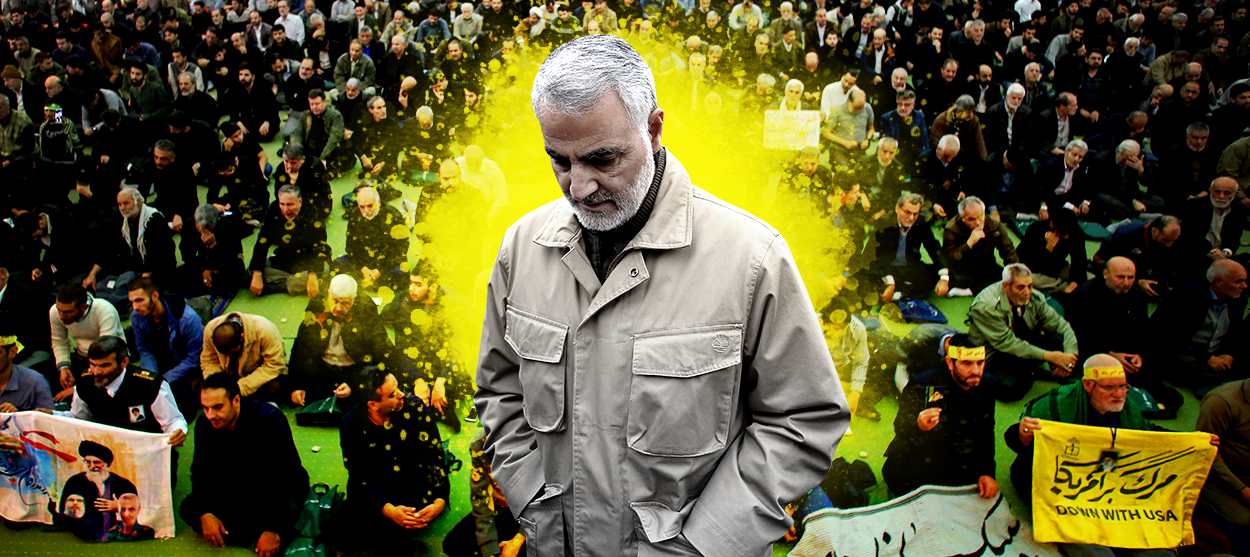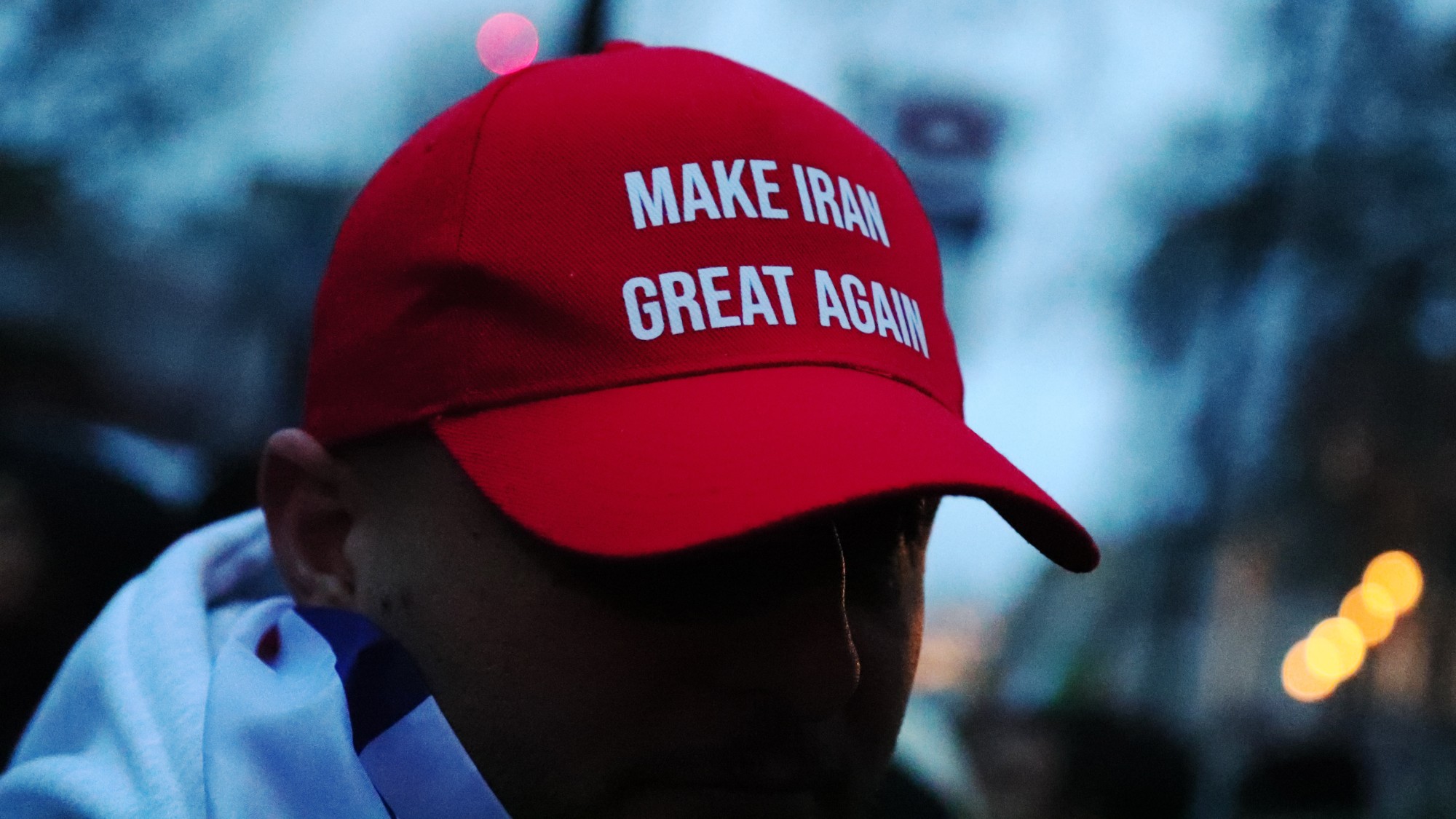America is guilty of everything we accuse Iran of doing
The fundamental hypocrisy of the American war machine


A free daily email with the biggest news stories of the day – and the best features from TheWeek.com
You are now subscribed
Your newsletter sign-up was successful
Donald Trump drastically escalated the United States' ongoing conflict with Iran on Thursday night by ordering the assassination of Iran's General Qassem Soleimani with an airstrike on the Baghdad International Airport. It takes what was arguably already a war (with an economic blockade and regular skirmishes with Iranian proxy forces) to a straight-up shooting war.
Events like this bring out the absolute worst in the American foreign policy community. Many conservative writers and thinkers, including former National Security Adviser John Bolton, the Hudson Institute's Michael Doran, and Commentary's Noah Rothman, openly cheered this Putin-style cold-blooded murder of a foreign statesman. Other more supposedly nonpartisan commentators uncritically parroted Trump administration assertions that Iran was planning something bad. Every top Democratic presidential candidate except Bernie Sanders was careful to foreground that Soleimani was a bad guy before condemning the assassination in their initial comments.
The truth is that Soleimani was not all that different from any of about five dozen current and former American politicians and bureaucrats — if anything, he was considerably more restrained about the use of force. Yes, he was involved in a lot of bloody wars — but so was every American president since 2000, and besides half the wars he fought in were started or fueled by the United States. It's just another instance of America's gigantic hypocrisy when it comes to war.
The Week
Escape your echo chamber. Get the facts behind the news, plus analysis from multiple perspectives.

Sign up for The Week's Free Newsletters
From our morning news briefing to a weekly Good News Newsletter, get the best of The Week delivered directly to your inbox.
From our morning news briefing to a weekly Good News Newsletter, get the best of The Week delivered directly to your inbox.
As writer Derek Davison explains, Soleimani was no ordinary general. He was more like a cross between the American vice president and the secretary of state — one of the two or three most famous and powerful people in Iran behind Supreme Leader Ali Khamenei. Soleimani commanded the Quds Force, a Special Forces-type operation supporting Iranian allies in Iraq, Lebanon, Syria, and many other countries. American hardliners hate him mainly for supporting Hezbollah and Hamas, and for arming insurgents who fought the American occupation of Iraq. Incidentally, as recently as September 2015, Trump plainly had no idea whatsoever who Soleimani was. Indeed, as Mehdi Hasan writes at The Intercept, when Hugh Hewitt asked him about the Quds Force, he thought Hewitt had said "Kurds."
So yes, Soleimani has fueled a lot of nasty conflicts and killed a lot of people, directly or indirectly, many of them American soldiers — though it's worth noting also that much of his recent effort has been dedicated to fighting ISIS (with great effectiveness, by all accounts) in a tacit uneasy alliance with U.S. forces.
Yet even the worst of Soleimani's record pales in comparison with the most blood-drenched American warmongers. If Soleimani deserves condemnation for arming Iraqi insurgents, then George W. Bush and Dick Cheney deserve 10 times as much for starting the war in the first place. It was a pointless, illegal war of aggression sold on lies that obliterated Iraqi society and killed perhaps half a million people, almost all of them innocent civilians. (Our own Soleimani, General David Petraeus, was connected to the operation of Iraqi torture dungeons and paramilitary death squads during the fight against the insurgency.)
If Soleimani deserves blame for helping Bashar al-Assad brutally defeat Syrian rebels, Henry Kissinger deserves 10 times as much for orchestrating the bombing slaughter of perhaps a quarter million Cambodians and paving the way for the Khmer Rouge genocide that killed 1.7 million people.
A free daily email with the biggest news stories of the day – and the best features from TheWeek.com
If any accused war criminal at an airport is fair game, then there are a lot of people in D.C. and Northern Virginia who better start traveling by train or ship.
Indeed, the Quds Force itself was originally created during the Iran-Iraq War, which was started by a heavily U.S.-backed Saddam Hussein in 1980. A million Iranians died in the grueling eight-year conflict. And the reason the Islamic Republic exists in the first place is because the United States and Britain toppled Iran's fledgling democracy in 1953 and installed a brutal dictator.
It is not exactly hard to understand why Iran — like about every other country in the Middle East — keeps some brutal, hard people like Soleimani around. It's a violent, unstable neighborhood, and war is an unavoidable reality. And no country is more responsible for that fact than the United States.
Chauvinist American commentators always presume America has the best intentions, and that the American military is composed of saintly warrior-poets. The reality is that the lumbering American colossus has unleashed a Thirty Years' War-level of violent chaos all around Iran for no good reason at all. We are ruled by a president who recently reversed the demotion of a guy turned in by his own fellow soldiers for war crimes — namely, gleefully murdering helpless prisoners, old men, and little girls for sport.
The apparent fact that the Soleimani assassination was carried out by drone strike at a civilian airport really is the perfect capstone for the last two decades of lunatic American violence. Nothing deflates the hysterically macho chest-thumping self-image of American warmongers than the fact that for the last decade and more the signature U.S. method of killing people has been a robot plus a gamer in a box 10,000 miles away. Raining down drone missiles on a guy in plain sight at a civilian airport — built at vast expense with U.S. money, by the way — just drives the cowardice home further. Nothing gets the armchair generals more fired up than vaporizing somebody who can't defend themselves or fight back in any way.
But as Davison writes, there could still very well be serious blowback from this assassination. The Iraqi government, which is teetering on the edge of collapse, was enraged at this contemptuous violation of its sovereignty, and will likely move to expel all U.S. forces from the country. There are a dozen places Iran could strike back — either at overextended American bases, or by disrupting oil shipping, or by a swarm attack on an American carrier group, or some other way.
The United States is so powerful that it has been able to get away with decades of pointless atrocities. One of these days it will pay for its imperial hubris. That day may be quite soon.
Want more essential commentary and analysis like this delivered straight to your inbox? Sign up for The Week's "Today's best articles" newsletter here.
Ryan Cooper is a national correspondent at TheWeek.com. His work has appeared in the Washington Monthly, The New Republic, and the Washington Post.
-
 The ‘ravenous’ demand for Cornish minerals
The ‘ravenous’ demand for Cornish mineralsUnder the Radar Growing need for critical minerals to power tech has intensified ‘appetite’ for lithium, which could be a ‘huge boon’ for local economy
-
 Why are election experts taking Trump’s midterm threats seriously?
Why are election experts taking Trump’s midterm threats seriously?IN THE SPOTLIGHT As the president muses about polling place deployments and a centralized electoral system aimed at one-party control, lawmakers are taking this administration at its word
-
 ‘Restaurateurs have become millionaires’
‘Restaurateurs have become millionaires’Instant Opinion Opinion, comment and editorials of the day
-
 Witkoff and Kushner tackle Ukraine, Iran in Geneva
Witkoff and Kushner tackle Ukraine, Iran in GenevaSpeed Read Steve Witkoff and Jared Kushner held negotiations aimed at securing a nuclear deal with Iran and an end to Russia’s war in Ukraine
-
 ‘The mark’s significance is psychological, if that’
‘The mark’s significance is psychological, if that’Instant Opinion Opinion, comment and editorials of the day
-
 ‘My donation felt like a rejection of the day’s politics’
‘My donation felt like a rejection of the day’s politics’Instant Opinion Opinion, comment and editorials of the day
-
 How Iran protest death tolls have been politicised
How Iran protest death tolls have been politicisedIn the Spotlight Regime blames killing of ‘several thousand’ people on foreign actors and uses videos of bodies as ‘psychological warfare’ to scare protesters
-
 ‘It may portend something more ominous’
‘It may portend something more ominous’Instant Opinion Opinion, comment and editorials of the day
-
 What are Donald Trump’s options in Iran?
What are Donald Trump’s options in Iran?Today's Big Question Military strikes? Regime overthrow? Cyberattacks? Sanctions? How can the US help Iranian protesters?
-
 Unrest in Iran: how the latest protests spread like wildfire
Unrest in Iran: how the latest protests spread like wildfireIn the Spotlight Deep-rooted discontent at the country’s ‘entire regime’ and economic concerns have sparked widespread protest far beyond Tehran
-
 The billionaires’ wealth tax: a catastrophe for California?
The billionaires’ wealth tax: a catastrophe for California?Talking Point Peter Thiel and Larry Page preparing to change state residency
